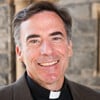Editor’s note: The following is an excerpt from The Ignatian Adventure by Kevin O’Brien, SJ, copyright 2011 by Loyola Press. This is reprinted with permission of Loyola Press. To order copies please call 1-800-621-1008 or go to www.loyolapress.com/obrien.
It’s slowly been dawning on us here at The Jesuit Post how much we’ve been using the phrase “Spiritual Exercises” without really ever explaining just what these exercises are, what they’re meant to do, or why they mean so much to us. To make up for this glaring disservice, we here at The Jesuit Post are proud to offer excerpts from The Ignatian Adventure, a new book by Kevin O’Brien, S.J., who is the Vice President for Mission and Ministry at Georgetown University.
This first of our five excerpts gives a brief introduction to St. Ignatius’ famous collection of exercises in prayer and discernment. While the Exercises take many forms in contemporary spirituality, they are experienced most often in the traditional 30-day silent retreat (which every Jesuit undertakes twice in his life), in 8-day silent retreats, or over an extended length of time in one’s everyday life. Since excerpts hardly do O’Brien’s comprehensive book justice, we encourage you to read The Ignatian Adventure in full.
***
Spiritual Exercises
Ignatius gave the church the Spiritual Exercises as a testament to God’s gentle, persistent laboring in his life. Over his lifetime, Ignatius became convinced that the Exercises could help other people draw closer to God and discern God’s call in their lives, much as they had helped him.
The Exercises have never been for Jesuits alone. Ignatius crafted the Exercises as a layman, and he intended them to benefit the entire church. He honed them as he offered the Exercises to a variety of people. Inspired by the Second Vatican Council, the Society of Jesus has continued to offer the Exercises in varied and creative ways to ever-increasing numbers of people…
Thus, the purpose of the Exercises is very practical: to grow in union with God, who frees us to make good decisions about our lives and to “help souls.” Ignatius invites us into an intimate encounter with God, revealed in Jesus Christ, so that we can learn to think and act more like Christ. The Exercises help us grow in interior freedom from sin and disordered loves so that we can respond more generously to God’s call in our life (SE 2, 21).1 The Exercises demand much of us, engaging our intellect and emotions, our memory and will. Making the Exercises can be both exhilarating and exhausting; it’s no wonder that Ignatius com- pared making the Spiritual Exercises to doing physical exercise, such as “taking a walk, traveling on foot, and running” (SE 1).
The Exercises are a school of prayer. The two primary forms of praying taught in the Exercises are meditation and contemplation. In meditation, we use our intellect to wrestle with basic principles that guide our life. Reading Scripture, we pray over words, images, and ideas. We engage our memory to appreciate the activity of God in our life. Such insights into who God is and who we are before God allow our hearts to be moved.
Contemplation is more about feeling than thinking. Contemplation often stirs the emotions and inspires deep, God- given desires. In contemplation, we rely on our imaginations to place ourselves in a setting from the Gospels or in a scene pro- posed by Ignatius. Scripture has a central place in the Exercises because it is the revelation of who God is, particularly in Jesus Christ, and of what God does in our world. In the Exercises, we pray with Scripture; we do not study it. Although Scripture study is central to any believer’s faith, we leave for another time extended biblical exegesis and theological investigation.
The Movements of the Exercises
The Exercises have a natural rhythm. Ignatius divides the Exercises into four “weeks” (SE 4). These weeks are not calendar weeks but phases or movements felt within a person who is praying through the Exercises:
- Preparation Days: Just as marathon runners do not begin a race with a sprint, we start the Exercises slowly and gently. We till the soil a bit before doing any planting. In the first days of the full Exercises, we consider the gift of God’s ongoing creation in the world and in us. We pray for a spirit of awe and gratitude for the gifts of God in our lives. We hope to experience a deeply felt sense of God’s unconditional love for us.
- First Week: Having recognized God’s boundless generosity to us, we naturally face our own limited response. We let God reveal to us our sinfulness and need for conversion. We acknowledge how we have misused God’s gift of freedom. With God’s help, we recognize and understand the patterns of sin in our lives. We do so in the context of knowing deep down how much God loves us and wants to free us from everything that gets in the way of loving God, others, and ourselves—that is, from everything that makes us unhappy. We pray for the grace of embracing ourselves as loved sinners. We keep our gaze fixed always on God’s mercy.
- Second Week: Having experienced God’s faithful love, we are moved to respond with greater generosity. We want to love and serve God and others more. As we pray through the life of Jesus Christ presented in the Gospels, we ask to know him more intimately so that we can love him more dearly and follow him more closely. We come to appreciate Jesus’ values and his vision of the world. This heartfelt knowing that leads to concrete action is a defining grace of the Exercises.
- Third Week: Our deepening personal identification with Jesus inspires us to want to be with him in his suffering and death. We spend time contemplating the Lord’s passion, which is the consummate expression of God’s faithfulness and love for us.
- Fourth Week: Just as we accompany Jesus in the Passion, we walk with the Risen Lord in the joy of the resurrected life. We continue to learn from him as he consoles others. Having savored God’s love for us and our world, we pray with a generous heart to find God in all things, to love and serve God and others in concrete ways and with great enthusiasm.
— — — — —



